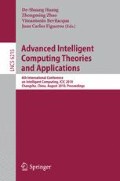Abstract
In this paper, a new method is proposed to measure the performance of service composition. Due to the nondeterministic response in the Internet, we model service composition by a group of fuzzy differential equations, where each equation describes the state change of the service composition. By using RKF method, approximate reasoning rules, and fuzzy simulation principle, we obtain the the numerical solutions. Our performance analysis is based on the solutions of the these equations. Three measure indexes have been considered: response time, throughput and resource utilization rate. A case study demonstrates the advantages.
This work is partially supported by NSF(No. 90818013) and Zhejiang NSF(No.Z1090357).
Access this chapter
Tax calculation will be finalised at checkout
Purchases are for personal use only
Preview
Unable to display preview. Download preview PDF.
References
Ascher, U.M., Petzold, L.R.: Computer methods for ordinary differential equations and differential-algebraic equations. Society for Industrial & Applied Mathematis, Philadelphia (1998)
Bause, F., Kritzinger, F.: Stochastic Petri Nets-An Introduction to the Theory. Vieweg Verlag (2002)
Chalco-Cano, Y., Román-Flores, H.: Comparation between some approaches to solvefuzzy differential equations. Fuzzy Sets and Systems 160, 1517–1527 (2009)
David, R., Alla, H.: Continuous Petri nets. In: Proceedings of the 8th European Workshop on Application and Theory of Petri nets, pp. 275–294 (1987)
Kaleva, O.: Fuzzy differential equation. Fuzzy Sets and Systems 24, 301–317 (1987)
Zadeh, L.A.: The concept of a linguistic variable and its applications in approximate reasoning. Information Sciences 8, 119–251 (1975)
Zhou, Y., Murata, T., DeFanti, T.: Modeling and Performance Analysis Using Extended Fuzzy-Timing Petri Nets for Networked Virtual Environments. IEEE Transactions on Systems, Man, and Cybernetics-Part B: Cybernetics 30(5) (2000)
Author information
Authors and Affiliations
Editor information
Editors and Affiliations
Rights and permissions
Copyright information
© 2010 Springer-Verlag Berlin Heidelberg
About this paper
Cite this paper
Ding, Z., Shen, H. (2010). Applying Fuzzy Differential Equations to the Performance Analysis of Service Composition. In: Huang, DS., Zhao, Z., Bevilacqua, V., Figueroa, J.C. (eds) Advanced Intelligent Computing Theories and Applications. ICIC 2010. Lecture Notes in Computer Science, vol 6215. Springer, Berlin, Heidelberg. https://doi.org/10.1007/978-3-642-14922-1_16
Download citation
DOI: https://doi.org/10.1007/978-3-642-14922-1_16
Publisher Name: Springer, Berlin, Heidelberg
Print ISBN: 978-3-642-14921-4
Online ISBN: 978-3-642-14922-1
eBook Packages: Computer ScienceComputer Science (R0)

